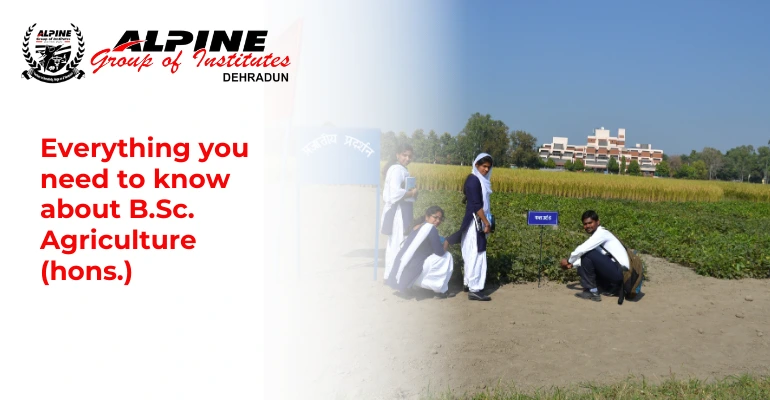Everything You Need to Know About B.Sc (Hons) Agriculture
2025-07-05 6:50Everything You Need to Know About B.Sc (Hons) Agriculture
The B.Sc (Hons) Agriculture is a specialized undergraduate degree designed to prepare students for a career in the dynamic and essential field of agriculture. Agriculture plays a vital role in global food production, economic development, and environmental sustainability, and a degree in agriculture can open the door to a variety of rewarding career paths. Whether you are passionate about crop science, animal husbandry, sustainable farming, or agricultural technology, a B.Sc (Hons) Agriculture course provides comprehensive knowledge and practical skills needed to excel in the agricultural sector.
What is B.Sc (Hons) Agriculture?
B.Sc (Hons) Agriculture is a four-year undergraduate program that offers in-depth knowledge in agricultural science. The “Hons” (Honours) designation indicates that the course provides a deeper understanding and a higher level of specialization in agricultural subjects compared to the regular B.Sc Agriculture. The curriculum integrates various aspects of agriculture, such as crop production, soil science, agricultural engineering, pest management, agricultural economics, and rural development, to equip students with the skills necessary to contribute to the evolving agricultural industry.
B.Sc. Agriculture Honors Course Details
| Particulars | Values |
| Degree Name | B.Sc. Agriculture Honours |
| Degree Type | Bachelor of Science |
| Duration | 4 years |
| Eligibility Criteria | 10+2 (or equivalent) with a background in Science |
| Admission Process | Entrance-based and Direct (Private Universities) |
| Average Fees | Rs. 8,420 – Rs.6 lakhs |
| Average Salary | Rs. 3 -10 LPA |
| Job Profile | Agriculture officer, Assistant Plantation Manager, Agricultural Research Scientist, Agriculture Development Officer, Agriculture Technician, Agriculturists, etc. |
| Top Recruiters | Agrotech Food, Research labs, ITC Limited, Syngenta, Fertilizer Companies, Government bodies and Institutes, Colleges, etc. |
B.Sc. Agriculture Honours Eligibility Criteria
- Educational Qualification: You must have completed Class 12 (or equivalent) with a background in Science. A combination of Physics, Chemistry, Biology, and/or Mathematics is usually required, though some universities may accept students with a focus on Biology alone.
- Minimum Marks: Many universities require a minimum aggregate percentage (typically 50-60%) in your 12th-grade exams. The exact percentage may vary by institution.
Course Structure
The B.Sc (Hons) Agriculture program typically spans four years, divided into eight semesters. Each year, students engage in a mix of theoretical classes, practical sessions, lab work, field visits, and internships.
- Year 1: Introduction to the basics of agriculture, including subjects like chemistry, biology, soil science, and crop production.
- Year 2: Focus on advanced subjects such as agricultural microbiology, plant pathology, and animal husbandry.
- Year 3: Specializations and advanced topics like irrigation systems, pest management, and farm management.
- Year 4: Practical work, internships, and research projects in the final year. Students may choose electives based on their area of interest, such as organic farming, agricultural economics, or agribusiness.
Fees for B.Sc (Hons) Agriculture
The fees for B.Sc (Hons) Agriculture courses vary depending on the institution and whether it is a government or private university. On average, the annual tuition fees can range from:
- Government Universities: ₹20,000 to ₹50,000 per year
- Private Universities: ₹50,000 to ₹1,50,000 per year
Additionally, there may be extra charges for lab fees, field trips, hostel accommodation, and other miscellaneous expenses.
B.Sc. Agriculture Honours Syllabus
| SEMESTER 1 | SEMESTER 2 |
| AG101 – Introduction to Agriculture | AG201 – Crop Production and Management |
| AG102 – Fundamentals of Soil Science | AG202 – Fundamentals of Plant Pathology |
| AG103 – Agricultural Economics | AG203 – Soil Fertility and Nutrient Management |
| AG104 – Agronomy I: Crop Production | AG204 – Agricultural Extension and Communication |
| AG105 – Agricultural Botany | AG205 – Agricultural Statistics |
| AG107 – Environmental Science | AG206 – Farm Machinery and Equipment |
| SEMESTER 3 | SEMESTER 4 |
| AG301 – Plant Breeding and Seed Technology | AG401 – Agricultural Engineering |
| AG301 – Plant Breeding and Seed Technology | AG401 – Agricultural Engineering |
| AG303 – Agroforestry | AG403 – Post-Harvest Management |
| AG304 – Entomology | AG404 – Agricultural Marketing |
| AG305 – Irrigation and Water Management | AG405 – Organic Farming |
| AG306 – Soil Conservation and Watershed Management | — |
| SEMESTER 5 | SEMESTER 6 |
| AG501 – Livestock and Poultry Management | AG601 – Agro-industrial Management |
| AG502 – Plant Growth Regulators and Biotechnology | AG602 – Agricultural Policy and Planning |
| AG503 – Crop Protection and Management | AG603 – Precision Farming |
| AG504 – Agricultural Economics and Rural Development | AG604 – Sustainable Agricultural Practices |
| AG505 – Climate Change and Agriculture | AG605 – Field Study and Practical Work |
| SEMESTER 7 | SEMESTER 8 |
| AG701 – Crop Improvement and Biotechnology | AG801 – Rural Sociology and Extension |
| AG702 – Water Resources and Irrigation Management | AG802 – Business Management in Agriculture |
| AG703 – Agricultural Finance and Accounting | AG803 – Agricultural Projects and Thesis |
| AG704 – Research Methodology and Statistical Analysis | AG804 – Entrepreneurship in Agriculture |
Career Options after B.Sc. Agriculture Honours
Agriculture is not just about working on farms—it’s a multifaceted industry with opportunities across a broad range of fields.
- Agriculture officer
- Farm Management
- Assistant Plantation Manager
- Agricultural Engineering
- Agricultural Scientist
- Agribusiness Management
- Agriculture Development Officers
- Agricultural Research & Development
- Soil Science
- Horticulture & Forestry
- Veterinary Science
- Food Technology & Processing
- Policy Making & Rural Development
Expected Salary after B.Sc. Agriculture Honours
Salaries for B.Sc (Hons) Agriculture graduates can vary widely depending on the industry, job role, and experience level. On average:
- Agricultural Scientist: ₹3-6 lakhs per annum
- Farm Manager: ₹3-7 lakhs per annum
- Agribusiness Manager: ₹4-8 lakhs per annum
- Horticulturist: ₹3-5 lakhs per annum
- Agricultural Consultant: ₹5-8 lakhs per annum
With experience, these salaries can increase significantly, especially for those who move into managerial roles or have advanced specializations.
Top Government B.Sc. Agriculture Honours Colleges in India
Central Universities Offering Agriculture Programs
- Banaras Hindu University (BHU), Varanasi
- University of Delhi (DU), New Delhi
- Jawaharlal Nehru University (JNU), New Delhi
- Aligarh Muslim University (AMU), Aligarh
- University of Allahabad, Allahabad
- Indira Gandhi National Open University (IGNOU), New Delhi
- Tezpur University, Assam
- North-Eastern Hill University (NEHU), Shillong
State Universities Offering Agriculture Programs
- Govind Ballabh Pantnagar University, Uttarakhand
- Uttar Pradesh Pandit Deen Dayal Upadhyaya Pashu Chikitsa Vigyan Vishwavidyalaya (DDUUP), Mathura
- Uttarakhand University of Horticulture and Forestry (UUHF), Bharsar
- Hemwati Nandan Bahuguna Garhwal University (HNBGU), Srinagar
- Kumaun University, Nainital
- University of Madras, Chennai
- University of Mumbai, Mumbai
- Punjab Agricultural University (PAU), Ludhiana
- Bihar Agricultural University (BAU), Sabour
- Rajasthan Agricultural University (RAU), Bikaner
- Jawaharlal Nehru Agricultural University (JNAU), Jabalpur
- Maharana Pratap University of Agriculture and Technology (MPUAT), Udaipur
- West Bengal University of Animal and Fishery Sciences (WBUAFS), Kolkata
Top Private colleges in India offering B.Sc. Agriculture Honours
- Chandigarh University, Punjab
- Amity University, Noida
- Lovely Professional University (LPU), Jalandhar
- Manipal University, Jaipur
- Shree Guru Gobind Singh Tricentenary University, Gurgaon
- Uttaranchal University, Dehradun
- Alpine Group of Institutes, Dehradun ( Affiliated from HNB)
- Shobhit University, Meerut
Conclusion
Agriculture graduates have a wealth of career opportunities across a diverse range of industries. Top recruiters span the agriculture and agribusiness sectors, research and development organizations, food processing companies, and even tech startups focused on agri-tech. With the growing importance of sustainable practices, food security, and technological innovation in agriculture, these industries continue to offer ample career prospects for graduates with a background in agriculture.
By selecting the right employer that aligns with your interests—whether it’s in research, agribusiness, technology, or policy—you can build a rewarding career that makes a significant impact on the agricultural sector.









